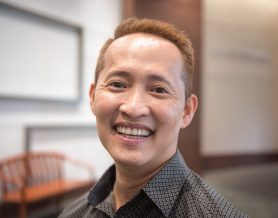A former refugee offers refuge to others
Senior financial analyst Kenny Lee has an amazing story to tell about his journey from Vietnam to America and MD Anderson, where he helps welcome new patients

Kenny Lee knows what it’s like to feel alone. At age 11, he left his native Vietnam, without family or friends, to begin a new life in America.
The journey was perilous and often lonely.
“I learned to care for myself and constantly fight for survival,” he says.
Today, Lee has come a long way. He’s a senior financial analyst in MD Anderson’s Division of Internal Medicine. He also volunteers with the cancer center’s greeter program where he welcomes new patients.
“Cancer can make you feel isolated from the outside world,” Lee says. “I, too, felt alone during my move to America, so I drew from my own experiences to help others.”
Born in Saigon during the Vietnam War, his mother supported the family by selling street food. Lee rarely saw his father, who eventually fled Vietnam and lived in a Malaysian refugee camp for two years before moving to the United States.
When Lee was 9, he and his mother tried to make it out by boat, but were captured and jailed overnight.
Over the next two years, they attempted three more escapes, but were captured each time.
With only enough money for a single boat fare, Lee’s mother put her then-11-year-old son on a boat in the middle of the night with 65 strangers.
They sailed for seven days before arriving at an Indonesian island, only to be turned away by the local government. Then, as they headed to another island nearby, their boat struck a coral reef and sank.
Lee and his fellow passengers swam to shore and camped for nine days until their food supply ran out. The United Nations High Commissioner for Refugees (UNHCR) became aware of the travelers’ plight and relocated them to the Pulau Galang refugee camp in Indonesia, where Lee lived for 10 months. With help from the UNHCR, he reconnected with his father and joined him at his home in Cleveland, Ohio.
“I didn’t know any English,” Lee says, “but with the help of a tutor, I was able to learn.”
But life with a father he barely knew was difficult. After years of friction with his father and stepmother, Lee ran away from home twice, then moved in with a friend’s family and received welfare and food stamps. During the day, he went to school. At night, he worked as a waiter.
When Lee was a high school senior, the family he lived with moved away. On the brink of exhaustion and with nowhere to turn, he once again contacted his father, who allowed him to move back in, provided he get a job and not attend college.
But Lee had other ideas. With student grants, loans and various part-time jobs, he attended Kent State University.
“I had very little contact with my dad while I was in college,” he says. “I invited him to my graduation, and was shocked when he attended.”
With dual degrees in finance and accounting and wanting a fresh start, Lee moved to Houston. He worked a few years as a tax preparer, then accepted a position at MD Anderson where he’s worked for 15 years.
During this time, he traveled back to Pulau Galang, the Indonesian refugee camp where he sheltered during childhood after leaving Vietnam. The camp was deserted and in disrepair, but some of the original buildings remained.
“I found the room where I stayed,” Lee says. “It brought back so many memories.”
Ten years ago, Lee’s stepmother called to say his dad had Stage IV lung cancer. Lee returned to Ohio for a final visit, and the estranged father and son reconciled. A year later, his father died in hospice at age 55.
In addition to his greeter duties, Lee volunteers with hospice patients. He’s especially drawn to patients without families.
“We all came into this world with empty hands and one day we’ll leave this world with nothing,” he says. “No matter what you have – money, titles, power – everyone just wants someone to talk to in the end.”











